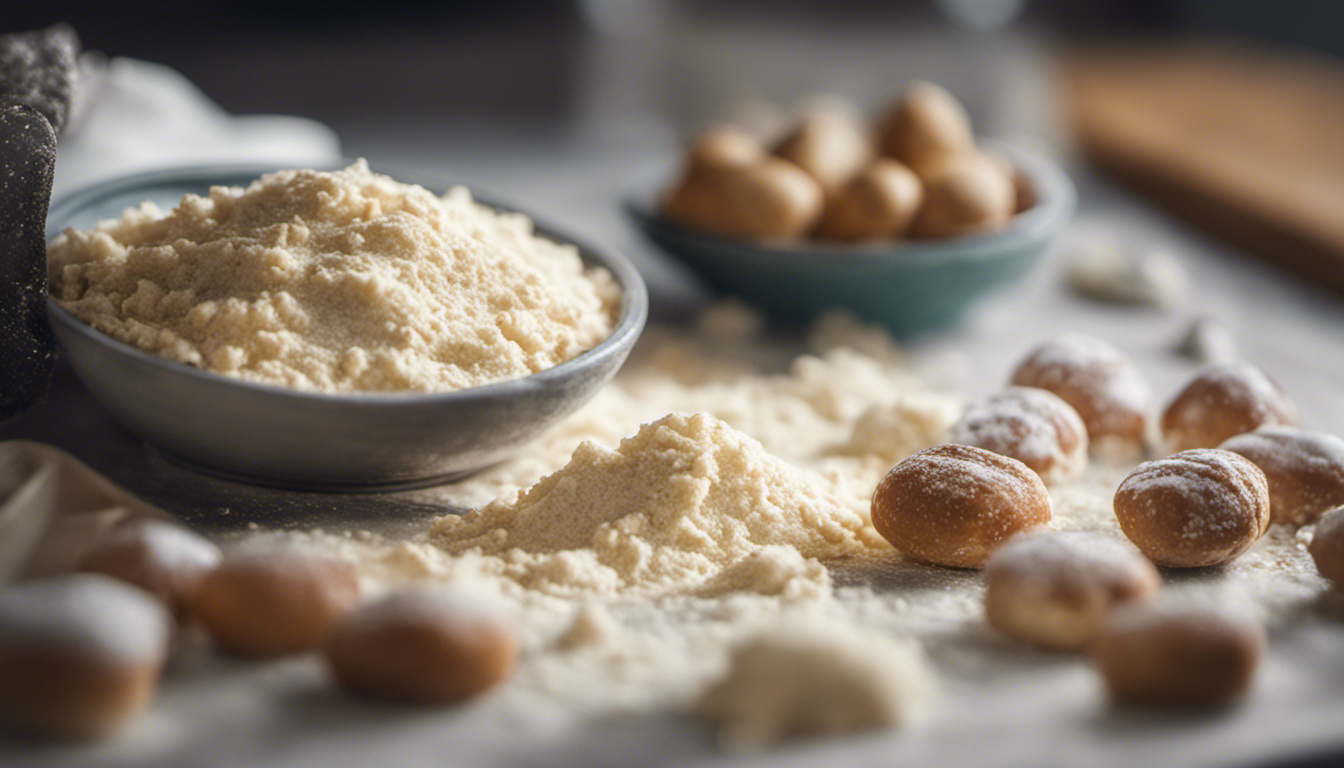
For newcomers to the keto diet, finding suitable products to stay within your recommended carb limit can be quite a challenge. Fortunately, creativity has opened up possibilities for retaining your favorite recipes without high-carb ingredients.
Baking may seem incompatible with a ketogenic diet due to its primary use of high-carb flour, including whole grains that are rich in carbs, which are off-limits on keto. However, there are low-carb alternatives that can replace regular flour in baking. These substitutes are not only low in carbs but also boast higher fiber and fat content, making them perfect for keto. Nut flours, in particular, are excellent for low-carb baking, imparting a delightful nutty flavor to your dishes.
Exploring Low Carb Flour for Baking
Embarking on low-carb baking need not be daunting. Choosing the right flour is the important first step. Traditional wheat flour is typically high in carbs and contains gluten, which may pose issues for people with celiac disease or non-celiac gluten sensitivity. To illustrate the carb content of wheat flour, ponder this data from the USDA for 100 grams of unenriched wheat flour:
- Energy: 370 kcals
- Total Carbs: 71.2 grams
- Dietary Fiber: 10.6 grams
- Net Carbs: 60.6 grams
- Protein: 15.1 grams
- Fat: 2.73 grams
These numbers clearly exceed your daily carb allowance on keto and could significantly impact blood sugar levels, making wheat flour unsuitable for diabetics.
Best Low Carb Flour Alternatives
Selecting the right alternative flour can be bewildering, as it should mimic the flavor, texture, and nutritional value of regular flour. Keep in mind that some of these alternatives can’t be substituted one-to-one in your recipes that call for wheat flour. Here’s a breakdown of some of the best low-carb baking flours:
- Almond Flour:
- Energy: 648 kcals per cup
- Total Carbs: 24 grams
- Dietary Fiber: 14 grams
- Net Carbs: 10 grams
- Protein: 24 grams
- Fat: 56 grams
Almond flour is a well-known option in the keto world. It’s user-friendly and can replace all-purpose flour in a 1:1 ratio. Ensure your recipes include adequate liquid ingredients to avoid a gritty texture. It is worth noting that almond flour is more expensive, imparts a nutty taste, and is high in calories.
- Coconut Flour:
- Energy: 441 kcals per cup
- Total Carbs: 83 grams
- Dietary Fiber: 48 grams
- Net Carbs: 35 grams
- Protein: 20 grams
- Fat: 14 grams
Coconut flour, with its unique flavor, has a higher carb count than almond flour but is still keto-friendly due to its strong flavor. It’s typically used in combination with other flours for the best taste and texture in recipes. You’ll need to add extra ingredients to maintain moisture in your baked goods.
- Other Nut Flours:
- Walnut flour (3 tbsp.): 1 gram of net carbs
- Hazelnut flour (100g): 5.6 grams of carbs
- Macadamia nut flour (1:1 ratio with wheat flour): 1:1
- Flaxseed Meal:
- Energy: 500 kcals per 100g
- Total Carbs: 28.6 grams
- Dietary Fiber: 28.6 grams
- Net Carbs: 0 grams
- Protein: 21.4 grams
- Fat: 42.9 grams
Flaxseed meal is rich in fiber and low in carbs and can be a great egg substitute for vegan recipes. It’s best for foods with dense textures and has a low glycemic index, making it suitable for diabetics.
- Psyllium Husk Powder:
- Energy: 200 kcals per 100g
- Total Carbs: 88.9 grams
- Dietary Fiber: 78 grams
- Net Carbs: 10.9 grams
Psyllium husk powder, high in absorbent fiber, is used in small amounts in combination with other flours for texture and volume. It resembles gluten in texture but may cause indigestion and bloating in large quantities.
- Sunflower Seed Flour:
- Energy: 209 kcals per cup
- Total Carbs: 22.9 grams
- Dietary Fiber: 3.33 grams
- Net Carbs: 19.57 grams
- Protein: 30.8 grams
- Fat: 1.03 grams
Sunflower seed flour is a rare nut-free option that can replace nut flours. It can be made at home and has a mild glycemic impact.
- Sesame Flour:
- Energy: 526 kcals per 100g
- Total Carbs: 26.6 grams
- Dietary Fiber: 0 grams
- Protein: 30.8 grams
- Fat: 37.1 grams
Sesame flour provides a unique flavor profile, and it is gluten-free, nut-free, and diabetic-friendly with a low glycemic index.
- Peanut Flour:
- Energy: 196 kcals per cup
- Total Carbs: 21 grams
- Dietary Fiber: 9.5 grams
- Net Carbs: 11.5 grams
- Protein: 31 grams
- Fat: 0.3 grams
Peanut flour offers a nutty taste and can be an alternative to almond flour, though it is lower in fat. It’s value for money and a good source of protein.
- Chia Seed Flour:
- Energy: 298 kcals per cup
- Total Carbs: 56 grams
- Dietary Fiber: 56 grams
- Net Carbs: 0 grams
- Protein: 26 grams
- Fat: 9 grams
Chia seed flour is exceptionally high in fiber and used in combination with other flours. It is beneficial for diabetics as it aids in satiety and blood sugar control.
- Oat Fiber:
- Negligible net carbs
Oat fiber, distinct from oat flour, is low in carbs and ideal for keto baking. It can be combined with almond flour for low-carb pancakes.
Note: Cassava flour, wheat flour, rice flour, chickpea flour, soya flour, and buckwheat flour are high in carbs and should be avoided on a keto diet.
Explore these low-carb flour alternatives to enjoy your favorite recipes while maintaining your ketogenic lifestyle. Remember to incorporate low-carb sweeteners for the ideal keto-friendly treat.